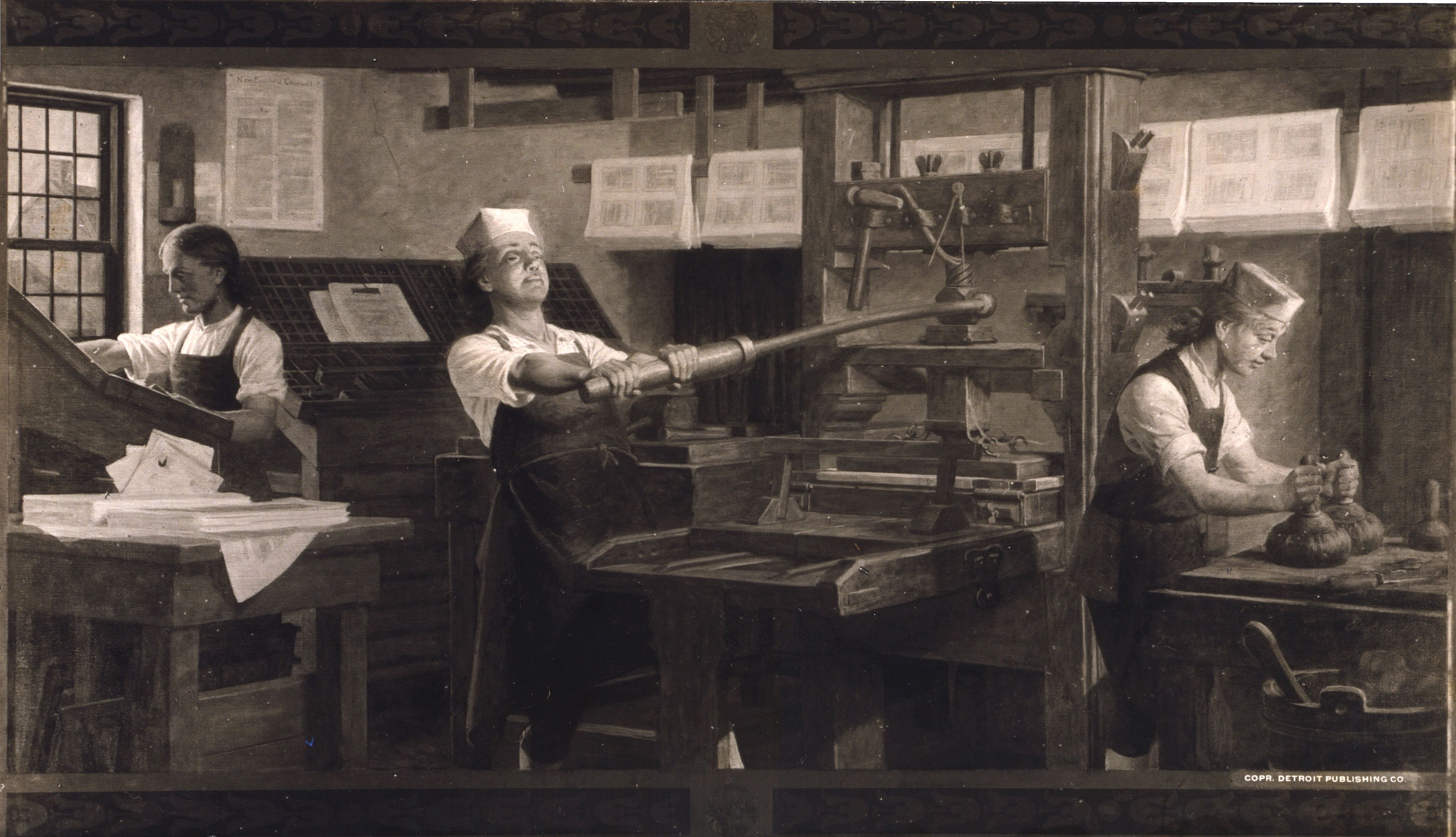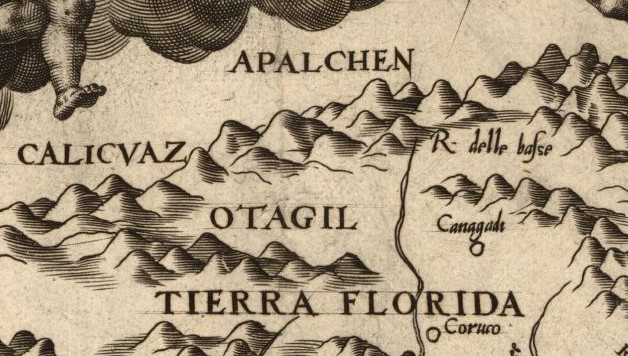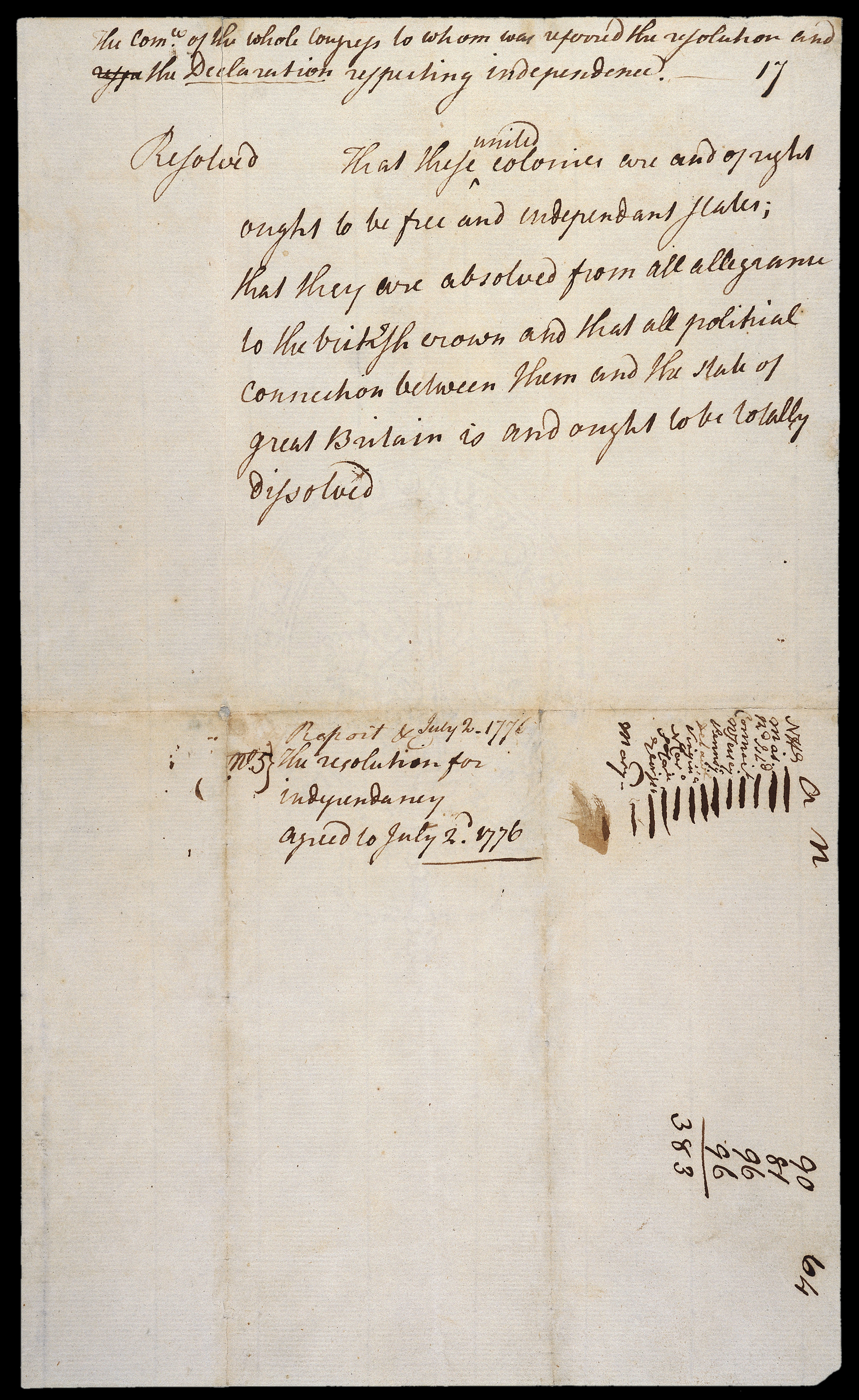|
2nd Continental Congress
The Second Continental Congress (1775–1781) was the meetings of delegates from the Thirteen Colonies that united in support of the American Revolution and Revolutionary War, which established American independence from the British Empire. The Congress constituted a new federation that it first named the United Colonies of North America, and in 1776, renamed the United States of America. The Congress began convening in present-day Independence Hall in Philadelphia, on May 10, 1775, with representatives from 12 of the 13 colonies, following the Battles of Lexington and Concord, the first battles of the Revolutionary War, which were fought on April 19, 1775. The Second Continental Congress succeeded the First Continental Congress, which met from September 5 to October 26, 1774, also in Philadelphia. The Second Congress functioned as the ''de facto'' federation government at the outset of the Revolutionary War by raising militias, directing strategy, appointing diplomats, and w ... [...More Info...] [...Related Items...] OR: [Wikipedia] [Google] [Baidu] |
American Revolution
The American Revolution (1765–1783) was a colonial rebellion and war of independence in which the Thirteen Colonies broke from British America, British rule to form the United States of America. The revolution culminated in the American Revolutionary War, which was launched on April 19, 1775, in the Battles of Lexington and Concord. Leaders of the American Revolution were Founding Fathers of the United States, colonial separatist leaders who, as British subjects, initially Olive Branch Petition, sought incremental levels of autonomy but came to embrace the cause of full independence and the necessity of prevailing in the Revolutionary War to obtain it. The Second Continental Congress, which represented the colonies and convened in present-day Independence Hall in Philadelphia, formed the Continental Army and appointed George Washington as its commander-in-chief in June 1775, and unanimously adopted the United States Declaration of Independence, Declaration of Independence ... [...More Info...] [...Related Items...] OR: [Wikipedia] [Google] [Baidu] |
United States
The United States of America (USA), also known as the United States (U.S.) or America, is a country primarily located in North America. It is a federal republic of 50 U.S. state, states and a federal capital district, Washington, D.C. The 48 contiguous states border Canada to the north and Mexico to the south, with the semi-exclave of Alaska in the northwest and the archipelago of Hawaii in the Pacific Ocean. The United States asserts sovereignty over five Territories of the United States, major island territories and United States Minor Outlying Islands, various uninhabited islands in Oceania and the Caribbean. It is a megadiverse country, with the world's List of countries and dependencies by area, third-largest land area and List of countries and dependencies by population, third-largest population, exceeding 340 million. Its three Metropolitan statistical areas by population, largest metropolitan areas are New York metropolitan area, New York, Greater Los Angeles, Los Angel ... [...More Info...] [...Related Items...] OR: [Wikipedia] [Google] [Baidu] |
Colony Of Virginia
The Colony of Virginia was a British Empire, British colonial settlement in North America from 1606 to 1776. The first effort to create an English settlement in the area was chartered in 1584 and established in 1585; the resulting Roanoke Colony lasted for three attempts totaling six years. In 1590, the colony was abandoned. But nearly 20 years later, the colony was re-settled at Jamestown, Virginia, Jamestown, not far north of the original site. A second charter was issued in 1606 and settled in 1607, becoming the first enduring English colonial empire, English colony in North America. It followed failed attempts at settlement on Newfoundland (island), Newfoundland by Sir Humphrey GilbertGilbert (Saunders Family), Sir Humphrey" (history), ''Dictionary of Canadian Biography'' Online, University of Toronto, May 2, 2005 in 1583 and the Roanoke Colony (in modern eastern North Carolina) by Sir Walter Raleigh in the late 1580s. The founder of the Jamestown colony was the Virginia Co ... [...More Info...] [...Related Items...] OR: [Wikipedia] [Google] [Baidu] |
Province Of Massachusetts Bay
The Province of Massachusetts Bay was a colony in New England which became one of the thirteen original states of the United States. It was chartered on October 7, 1691, by William III and Mary II, the joint monarchs of the kingdoms of England, Scotland, and Ireland, and was based in the merging of several earlier British colonies in New England. The charter took effect on May 14, 1692, and included the Massachusetts Bay Colony, the Plymouth Colony, the Province of Maine, Martha's Vineyard, Nantucket, Nova Scotia, and New Brunswick; the Commonwealth of Massachusetts is the direct successor. Maine has been a separate state since 1820, and Nova Scotia and New Brunswick are now Canadian provinces, having been part of the colony only until 1697. The name Massachusetts comes from the Massachusett Indians, an Algonquian peoples, Algonquian tribe. It has been translated as "at the great hill", "at the place of large hills", or "at the range of hills", referencing the Blue Hills Re ... [...More Info...] [...Related Items...] OR: [Wikipedia] [Google] [Baidu] |
John Hancock
John Hancock ( – October 8, 1793) was an American Founding Fathers of the United States, Founding Father, merchant, statesman, and prominent Patriot (American Revolution), Patriot of the American Revolution. He was the longest-serving President of the Continental Congress, president of the Continental Congress, having served as the second president of the Second Continental Congress and the seventh president of the Congress of the Confederation. He was the first and third governor of the Commonwealth of Massachusetts. His large and stylish Signing of the United States Declaration of Independence, signature on the United States Declaration of Independence led to or becoming a colloquialism for a person's signature. He also signed the Articles of Confederation, and used his influence to ensure that Massachusetts ratified the United States Constitution in 1788. Before the American Revolution, Hancock was one of the wealthiest men in the Thirteen Colonies, having inherited a p ... [...More Info...] [...Related Items...] OR: [Wikipedia] [Google] [Baidu] |
Province Of Pennsylvania
The Province of Pennsylvania, also known as the Pennsylvania Colony, was a British North American colony founded by William Penn, who received the land through a grant from Charles II of England in 1681. The name Pennsylvania was derived from Latin, meaning "Penn's Woods", a reference to William Penn's father Admiral Sir William Penn. History European settlement The Province of Pennsylvania was one of two major Restoration colonies in colonial-era British America. A plan for government of the colony of Pennsylvania was heavily influenced by the ideas and utopian aspirations of English political scientist James Harrington. The proprietary colony's charter remained in the Penn family until the Penns were ousted in 1776 during the American Revolutionary War, and the Commonwealth of Pennsylvania was established as one of the original thirteen states. In June 1776, the Lower counties on the Delaware, a separate colony within the Province of Pennsylvania, broke away from ... [...More Info...] [...Related Items...] OR: [Wikipedia] [Google] [Baidu] |
Benjamin Franklin
Benjamin Franklin (April 17, 1790) was an American polymath: a writer, scientist, inventor, statesman, diplomat, printer, publisher and Political philosophy, political philosopher.#britannica, Encyclopædia Britannica, Wood, 2021 Among the most influential intellectuals of his time, Franklin was one of the Founding Fathers of the United States; a Committee of Five, drafter and signer of the United States Declaration of Independence, Declaration of Independence; and the first United States Postmaster General, postmaster general. Born in the Province of Massachusetts Bay, Franklin became a successful Early American publishers and printers, newspaper editor and printer in Philadelphia, the leading city in the colonies, publishing ''The Pennsylvania Gazette'' at age 23. He became wealthy publishing this and ''Poor Richard's Almanack'', which he wrote under the pseudonym "Richard Saunders". After 1767, he was associated with the ''Pennsylvania Chronicle'', a newspaper known for it ... [...More Info...] [...Related Items...] OR: [Wikipedia] [Google] [Baidu] |
Appalachian Mountains
The Appalachian Mountains, often called the Appalachians, are a mountain range in eastern to northeastern North America. The term "Appalachian" refers to several different regions associated with the mountain range, and its surrounding terrain. The general definition used is one followed by the United States Geological Survey and the Geological Survey of Canada to describe the respective countries' Physiographic region, physiographic regions. The U.S. uses the term Appalachian Highlands and Canada uses the term Appalachian Uplands; the Appalachian Mountains are not synonymous with the Appalachian Plateau, which is one of the provinces of the Appalachian Highlands. The Appalachian range runs from the Newfoundland (island), Island of Newfoundland in Canada, southwestward to Central Alabama in the United States; south of Newfoundland, it crosses the 96-square-mile (248.6 km2) archipelago of Saint Pierre and Miquelon, an overseas collectivity of France, meaning it is technica ... [...More Info...] [...Related Items...] OR: [Wikipedia] [Google] [Baidu] |
Articles Of Confederation And Perpetual Union
The Articles of Confederation, officially the Articles of Confederation and Perpetual Union, was an agreement and early body of law in the Thirteen Colonies, which served as the nation's first frame of government during the American Revolution. It was debated by the Second Continental Congress at present-day Independence Hall in Philadelphia between July 1776 and November 1777, was finalized by the Congress on November 15, 1777, and came into force on March 1, 1781, after being ratified by all 13 colonial states. A central and guiding principle of the Articles was the establishment and preservation of the independence and sovereignty of the original 13 states. The Articles consciously established a weak confederal government, affording it only those powers the former colonies recognized as belonging to the British Crown and Parliament during the colonial era. The document provided clearly written rules for how the states' league of friendship, known as the Perpetual U ... [...More Info...] [...Related Items...] OR: [Wikipedia] [Google] [Baidu] |
United States Declaration Of Independence
The Declaration of Independence, formally The unanimous Declaration of the thirteen States of America in the original printing, is the founding document of the United States. On July 4, 1776, it was adopted unanimously by the Second Continental Congress, who convened at Pennsylvania State House, later renamed Independence Hall, in the Colonial history of the United States, colonial capital of Philadelphia. These delegates became known as the nation's Founding Fathers of the United States, Founding Fathers. The Declaration explains why the Thirteen Colonies regarded themselves as independent sovereign states no longer subject to British colonization of the Americas, British colonial rule, and has become one of the most circulated, reprinted, and influential documents in history. On June 11, 1776, the Second Continental Congress appointed the Committee of Five, including John Adams, Benjamin Franklin, Thomas Jefferson, Robert R. Livingston, and Roger Sherman, who were charged w ... [...More Info...] [...Related Items...] OR: [Wikipedia] [Google] [Baidu] |
Kingdom Of Great Britain
Great Britain, also known as the Kingdom of Great Britain, was a sovereign state in Western Europe from 1707 to the end of 1800. The state was created by the 1706 Treaty of Union and ratified by the Acts of Union 1707, which united the Kingdom of England (including Wales) and the Kingdom of Scotland to form a single kingdom encompassing the whole island of Great Britain and its outlying islands, with the exception of the Isle of Man and the Channel Islands. The unitary state was governed by a single Parliament of Great Britain, parliament at the Palace of Westminster, but distinct legal systems—English law and Scots law—remained in use, as did distinct educational systems and religious institutions, namely the Church of England and the Church of Scotland remaining as the national churches of England and Scotland respectively. The formerly separate kingdoms had been in personal union since the Union of the Crowns in 1603 when James VI of Scotland became King of England an ... [...More Info...] [...Related Items...] OR: [Wikipedia] [Google] [Baidu] |
Lee Resolution
The Lee Resolution, also known as "The Resolution for Independence", was the formal assertion passed by the Second Continental Congress on July 2, 1776, resolving that the Thirteen Colonies (then referred to as the United Colonies) were "free and independent States" and separate from the British Empire. This created what became the United States of America, and news of the act was published that evening in '' The Pennsylvania Evening Post'' and the following day in '' The Pennsylvania Gazette''. The Declaration of Independence, which officially announced and explained the case for independence, was approved two days later, on July 4, 1776. The resolution is named for Richard Henry Lee of Virginia, who proposed it to Congress after receiving instructions and wording from the Fifth Virginia Convention and its President Edmund Pendleton. Lee's full resolution had three parts which were considered by Congress on June 7, 1776. Along with the independence issue, it also proposed t ... [...More Info...] [...Related Items...] OR: [Wikipedia] [Google] [Baidu] |





